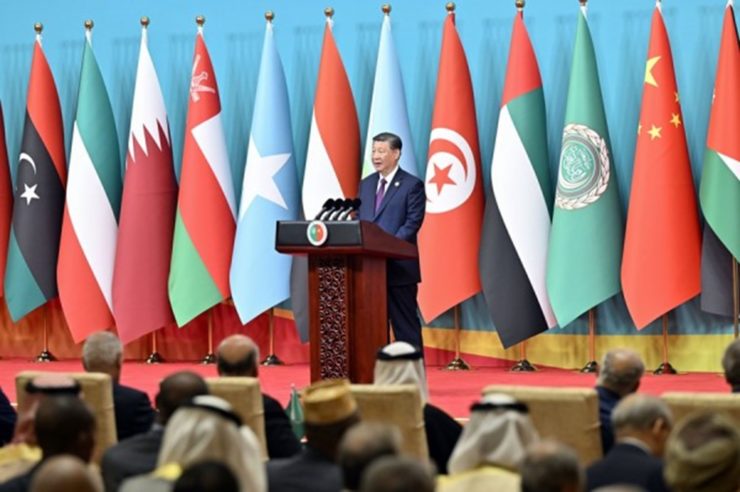
On May 30, 2024, the 10th session of the China-Arab States Cooperation Forum (CASCF), established in September 2004, was held in Beijing, China, marking the 20th anniversary of its creation. The forum was created after the visit of the then-Chinese President Hu Jintao to the headquarters of the Arab League in Cairo, Egypt. Cooperation between China and the Arab League was further strengthened through the Belt and Road Initiative.
The Rise of China and the Multipolar World Order
The dawn of the 21st century brought significant changes to the international world order. The United States’ influence as the sole superpower of the world has declined rapidly since the start of the current century. This decline of the US hegemony was further hastened by the rise of Russia and China in the world. The two Asian countries are leading the multipolar world order. Both countries are following an inclusive approach towards the developing and the underdeveloped world. Both states stand as the top global rivals of the United States. China is spearheading the anti-Western world order campaign around the globe. China’s rising influence in the volatile Gulf region has attracted significant attention from global policymakers and scholars. While the West has continuously been a source of instability and chaos in the Middle East, China’s mediation between Saudi Arabia and Iran created its image of stability in the Gulf region.
The CASCF: Strengthening China-Arab Relations and Addressing Regional Challenges
Recently, the 10th edition of the CASCF was held. The main rationale of the forum is to strengthen the ties between China and the Arab states and resolve regional issues. The CASCF is the sole multilateral forum between the two sides, comprising 22 nations. A meeting of the foreign ministers of all the member countries is held every 2 years. Hamid bin Isa Al-Khalifa, Sheikh Mohamed bin Zayed Al-Nahyan, Kais Saied of Tunisia, and President Abdel-Fattah El-Sisi of Bahrain, UAE, Tunisia, and Egypt attended the recent session of the forum.
Mauritania’s Foreign Affairs Minister, Mohamed Salem Ould Merzouk, and China’s Communist Party (CCP)’s Central Committee and Foreign Affairs Minister, Wang Yi, jointly chaired the summit. The Secretary General of the Arab League and the foreign ministers of the member Arab states attended this conference. Israel’s genocide in Gaza was the key agenda of the meeting. Leaders of all the member states expressed their deep concerns over the Israeli war crimes in Gaza and the human rights violations in Gaza. Chinese President Xi Jinping and members of all the Arab States emphasized an immediate ceasefire to stop human rights violations and civilian killings in Gaza.
China’s Soft Power and Vision for the Future
President Xi expressed China’s strong support for Palestine’s full membership in the UN. In addition, he also advocated the creation of an independent and sovereign Palestinian state, with East Jerusalem as its capital, based on the boundaries of 1967. He also sought an international peace conference on the issue.
President Xi stated, “Since October, the Palestinian-Israel conflict has escalated immensely, resulting in the large-scale suffering of people. War should not continue indefinitely. Justice should not be absent forever.” An urgent humanitarian aid package worth $69 million was also announced by the Chinese President, along with $3 million in additional aid for the United Nations Relief and Work Agency (UNRWA).
Participants also discussed the future of the Belt and Road Initiative (BRI) at the summit. The significance of the BRI in formulating the relations between the Arab states and China was also discussed. While discussing the importance of the BRI, the Chinese President stated, “The Silk Road spirit is passing from generation to generation, strengthening China and Arab relations.” China called for deepening cooperation in various sectors between the two sides, such as trade, oil, and gas. It also emphasized strengthening the economic cooperation between the Arab world.
Chinese Foreign Minister, Wang Yi, maintained that the Arab states and China will continue to enhance the exchange of capital, technology, and products to increase people-to-people collaboration. The summit also adopted two significant documents: “The Action Implementation Plan” and “The Beijing Declaration”. These documents were adopted to enhance cooperation between the two sides and foster cordial economic relations. Different ways to promote an Arab-China community are reviewed under the Beijing Declaration, strengthen bilateral cooperation, and emphasize the resolution of regional disputes through mutual cooperation. Artificial intelligence and climate change were also among the issues addressed under the declaration.
Moreover, the framework to cement Arab-China collaboration in several fields including politics and economy according to the Action Implementation Plan. President Xi stated, “As an Arab saying goes, friends are life’s sunshine. To uphold the spirit of China-Arab friendship, create a better future, and pave the way for an Arab-Chinese community with a shared destiny, we will keep cooperating with our Arab allies.” The summit demonstrates the increasing soft power of China among the Middle Eastern and Arab world. Furthermore, it would hasten China’s rise as the global hegemon. The rising influence of China and the middle powers in the changing world order could also bring stability in the Middle East due to China’s policy of non-interference.
Taut Bataut – is a researcher and writer that publishes on South Asian geopolitics, exclusively for the online magazine “New Eastern Outlook”.
